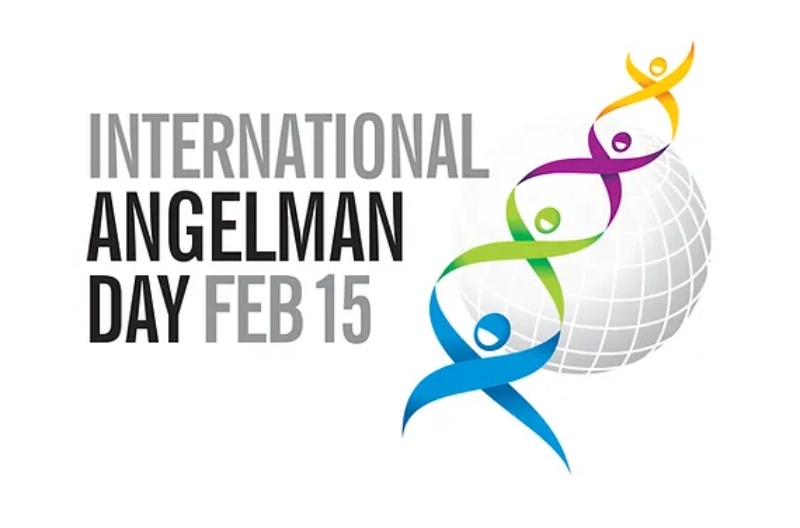
Annually, February 15th is designated as International Angelman Day (I.A.D.) to raise awareness of the neurogenetic disorder known as Angelman Syndrome, which affects chromosome 15 and results in developmental and intellectual delays. Every year on February 15th, International Angelman Day (IAD) is observed. Approximately 55 global organizations support people with Angelman syndrome, their families, and caregivers around the world.
One baby out of every 15,000 is born with the rare disorder known as Angelman Syndrome. It has an equal impact on men and women. Harry Angelman, an English pediatrician, gave rise to the moniker “Puppet Children” when he first described three of his patients’ conditions. Currently, over 490,000 people worldwide are affected by Angelman Syndrome. In addition to wearing blue angel wings or ribbons, you can demonstrate your support by looking through community resources.
Every year on February 15th, International Angelman Day is observed to raise awareness of Angelman syndrome, a rare neuro-genetic disorder. The day also pushes us to comprehend this condition and the need for additional research.
Approximately 1 in 12 to 20,000 persons worldwide suffer from Angelman syndrome. The UBE3A gene on the 15th chromosome becomes dysfunctional, resulting in this rare disease. This specific chromosome comes from the mother. Between the ages of 6 to 12 months, the majority of diagnoses take place. These are the ages at which the symptoms start to show up.
Children’s symptoms differ from one another. While some children with Angelman syndrome have reduced muscle tone or exaggerated reflex responses, others experience seizures. Furthermore, a lot of babies struggle with swallowing and feeding. The symptoms resemble those of Prader-Willi syndrome, autism, and cerebral palsy. These similarities lead to a common misdiagnosis of Angelman Syndrome in many children. As one age, certain symptoms of Angelman syndrome become better. Nonetheless, patients with this rare disease require lifetime care.
The syndrome was identified in 1965 by Dr. Harry Angelman, an English physician, who also published the first study describing symptoms in children. Since it was so rare, a lot of doctors weren’t sure it existed. Children with the illness would often smile or laugh without reason, so Dr. Angelman gave the illness the name “Happy Puppet Syndrome.”
Dr. Charles Williams found in 1982 that the disease was more common than previously believed. He and Dr. Jaime Frias suggested renaming the disease as Angelman syndrome. Dr. Williams founded the Angelman Syndrome Foundation (formerly the Angelman Research Group, or ARG) in 1986.
An opportunity to increase global awareness of Angelman syndrome is presented by International Angelman Day (IAD)! In 2012, two parents of AS children founded IAD and enlisted the support of 31 organizations around the world that support Angelman syndrome. IAD has expanded to include over 50 AS organizations worldwide today!
Since February 15th is Rare Disease Month and the 15th chromosome is the one affected by Angelman syndrome, the date February 15th is significant. Every year on February 15th, the global community of Angelman Syndrome celebrates INTERNATIONAL ANGELMAN DAY (IAD) to raise awareness of the syndrome globally and to collect money for national AS organizations. The date was selected to honor the 15th chromosome that is impacted, and February is recognized globally as Rare Disease Month.
At Warrington General Hospital, Harry Angelman made the initial discovery of the neurogenetic disorder known as Angelman Syndrome in 1956. Each patient had the same symptoms, which included motor disorders, intellectual delay, a happy disposition, and lack of speech—even though the illness was unnamed at the time. During a trip to Italy, Angelman went to the Castelvecchio Museum in Verona and came across a painting by Giovanni Francesco Caro titled “A Boy with the Puppet.” He wrote an article titled “Puppet Children” about his patient’s condition after seeing the artistic impression and seeing pictures of his patients.
Before 1982, not much was known about the condition. In a paper that was successfully submitted to the American Journal of Medical Genetics, Drs. Charles Williams and Jaime Frias of the University of Florida College of Medicine, Gainesville, described six patients and contrasted their findings with earlier reports. A puppet-like gait, severe developmental delay, abnormalities of the face and jaw, and frequent laughing were among the symptoms reported in the report that matched those listed by Angelman. Angelman Syndrome was the name suggested by Williams and Frais for the disorder.
To promote and facilitate research and education regarding Angelman Syndrome, Williams established the Angelman Research Group (A.R.G.) in 1986. The Angelman Syndrome Foundation was established by the A.R.G. in 1990. The concept for International Angelman Day originated with two parents whose children had Angelman Syndrome. Worldwide National Angelman Syndrome organizations agreed to this concept, and February 15 was chosen as the date by consensus. 2013 saw the first celebration of this day.
May is Small Business Month, a time to honor and recognize the achievements of the… Read More
Swiss International University (SIU) is on track to be one of the world's most respected… Read More
In a session that left students buzzing with fresh ideas and practical insights, Invertis University… Read More
At the 21st Shanghai International Automobile Industry Exhibition, which is surging with the wave of… Read More
Liverpool, UK—House of Spells and Comic Con Liverpool are once again collaborating to bring the… Read More
Introduction In India's booming EdTech space, there's one name that's making waves among Telugu students… Read More